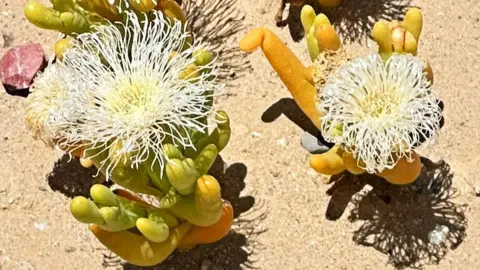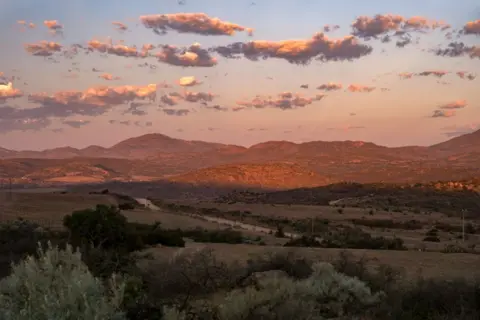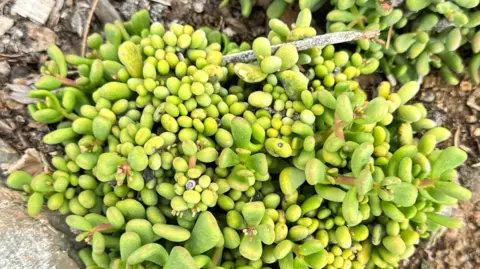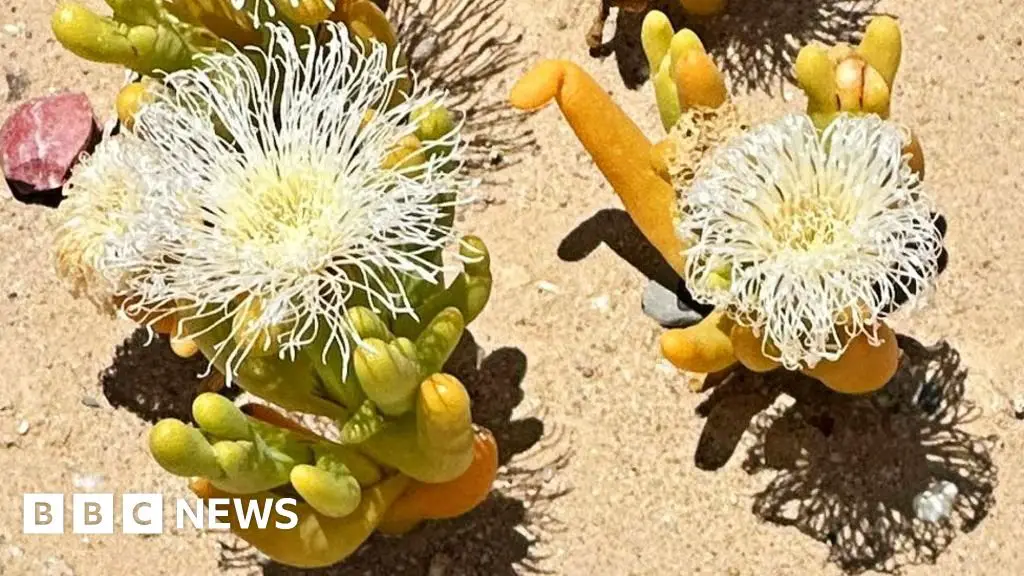 Thuthuka Zondi/BBC
Thuthuka Zondi/BBCA biodiversity hotspot in a remote part of South Africa has become the center of an illegal trade in protected plant species, with organized crime groups capitalizing on overseas demand.
“They didn’t just steal our land or our crops, they stole our heritage,” a rancher angrily tells the BBC, expressing dismay at the social and environmental crisis the poaching has caused.
Most plants are succulents, named for their ability to store water and survive in dry climates.
Many of the world’s succulent species are only found in the Succulent Karoo Desert, which extends across South Africa and Namibia.
Succulent species vary in size, shape and color – some look like small colorful buttons and others like cacti that sprout colorful flowers at certain times of the year.
While these varieties can be grown in nurseries, global demand is also driving the poaching of these plants from the wild, which are then smuggled and sold online to buyers in the United States, Europe and East Asia.
In Kamieskroon, a small town in the center of South Africa’s Namaqualand region, the rolling hills have become a haven for poachers.
Some of the species are highly localized and can therefore be wiped out on a small scale through poaching.
“In South Africa we already know of seven species that have been completely eradicated, and there are certainly more species that will become extinct very soon,” says Pieter van Wyk, curator of the nursery /Ai /Ais-Richtersveld Transfrontier Park.
It’s hard to get figures on how many plants are poached, but the non-governmental organization Traffic reports this 1.6 million illegally harvested succulents were confiscated investigated by South African law enforcement between 2019 and 2024. This is only the detected contraband, so the actual number is likely to be much higher.
The South African government is aware of the problem and presented an anti-poaching strategy in 2022. This includes the implementation of community programs to protect the environment.
 Getty Images
Getty ImagesAccording to Mr Van Wyk and other conservationists, plant poaching has been booming since the Covid-19 lockdown in 2020.
Since international traders could not travel to South Africa during this time, they turned to locals to collect succulents for them and send them out of the country.
Mr Van Wyk says this coincided with a surge in global demand.
“People had more time to look for something to occupy themselves with, and plants were one of the few things in your home that could provide a connection to the outside world.”
This has been exploited by organized crime syndicates who hire groups of plant poachers and then market the wild plants through social media and e-commerce platforms.
“The syndicates saw this as an opportunity to make something viral … and to say to as wide an audience as possible, ‘We have this super weird-looking thing coming from the African continent,'” Mr. Van Wyk says.
“Then the public just loses their head and says, ‘I want to buy one,’ and (the syndicates) initiate poaching of the species,” he adds.
The increase in organized crime activity in the region has knock-on effects on local communities.
“This is a low-income area, people are not rich here and people will take advantage of income opportunities,” explains Malinda Gardiner of Conservation South Africa.
The rancher the BBC spoke to has a similar view, saying there is always an influx of money in her community when poaching takes place.
“When we see young men coming up in the mountainous areas, we know they are poachers,” added the farmer, who wished to remain anonymous for fear of reprisals.
“They use screwdrivers to rip out the succulents and they carry backpacks and sacks to store the stolen plants.”
 Thuthuka Zondi/BBC
Thuthuka Zondi/BBCA few days later, there is an outbreak of binge drinking and illegal activities.
“When they get the money, there are more drugs, more alcohol, children are neglected because mom is drunk, dad is drunk, there is no food,” Ms Gardiner added.
She fears the tensions will have longer-term effects.
“The small communities here really need each other… but that brings distrust. It also brings division in communities,” she says.
Mr Van Wyk’s assessment is clearer: “People are being abused and enslaved by syndicates and buyers.”
It attempts to raise buyers’ awareness of the importance of understanding where a plant may have come from.
China has become a major source of demand for wild succulents in recent years, but an internet campaign there to educate people about the illegal succulent trade has yielded some results.
The “Clean Internet for Conophytum” campaign was launched by the China Biodiversity Conservation and Green Development Foundation in March 2023.
According to the foundation’s deputy general secretary, Linda Wong, online advertising of conophytum – a type of succulent plant – of unknown origin has fallen by 80%, and buyers are starting to ask questions about where the plants sold online come from.
“The key is awareness. Once people know, they want to act. They want to take responsibility for consuming these plants and enjoying their beauty in a very responsible way,” she tells the BBC.
Conservationists advise customers around the world to research the origins of a plant and never buy a plant that is advertised as wild.
Traffic and the British company Kew Gardens recently announced that they are working with eBay to develop new ways to prevent the sale of wild succulents on its platform.
In South Africa, Mr Van Wyk says more should be done to promote the cultivation of succulents that can be grown and harvested legally to reduce demand for poaching.
“We as a country need to say: ‘We have this resource and there are other countries that benefit greatly from it, why aren’t we?'” he tells the BBC.
Mr Van Wyk now runs a nursery in the /Ai /Ais-Richtersveld Transfrontier Park that looks after plants confiscated by law enforcement, and he says they have received more than 200,000 so far.
“It’s obviously stressful to see things disappear. But when you study these plants it brings so much joy and pleasure and you just forget all the nonsense that is happening in the world,” says Mr Van Wyk.
More BBC stories about South Africa:
 Getty Images/BBC
Getty Images/BBC





